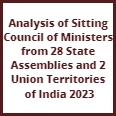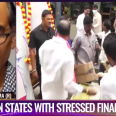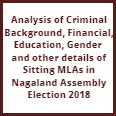



ADR-Daksh National Voters Survey
This is the largest ever survey in India with over 250,000 respondents in 525 constituencies of the Lok Sabha. It is perhaps the largest survey ever done in the world in one country. The purpose of the survey is not to predict the poll outcome.

ADR-Daksh Survey: Maharashtra Assembly Election 2014
ADR and Daksh have conducted a voter perception survey of over 20,000 respondents across all the 288 Assembly constituencies in Maharashtra in September ahead of the Maharashtra Assembly elections. The larger purpose of this survey was to highlight voter priorities so that they are reflected in the election agenda and manifestos of political parties. Respondents have also rated the performance of the status of governance on these issues in the past five years, reflecting a sort of “performance rating”.

Lok Sabha 2014, MP's rating on IBN
This is the largest ever survey in India with over 250,000 respondents in 525 constituencies of the Lok Sabha. It is perhaps the largest survey ever done in the world in one country. The purpose of the survey is not to predict the poll outcome.

Lok Sabha 2014, Performance Rating of MPs from Andhra Pradesh
The Association for Democratic Reforms (ADR) has conducted the largest ever survey in India with over 250,000 respondents in 530 Lok Sabha constituencies. The larger purpose of the survey is to highlight voter priorities so that elections in future are fought on voter issues, and more importantly, the manifestos of future Governments reflect voter priorities.

Lok Sabha 2014, ADR-Daksh Survey Report for Gujarat region
The Association for Democratic Reforms (ADR) has conducted the largest ever survey in India with over 250,000 respondents in 530 Lok Sabha constituencies. The larger purpose of the survey is to highlight voter priorities so that elections in future are fought on voter issues, and more importantly, the manifestos of future Governments reflect voter priorities.






















